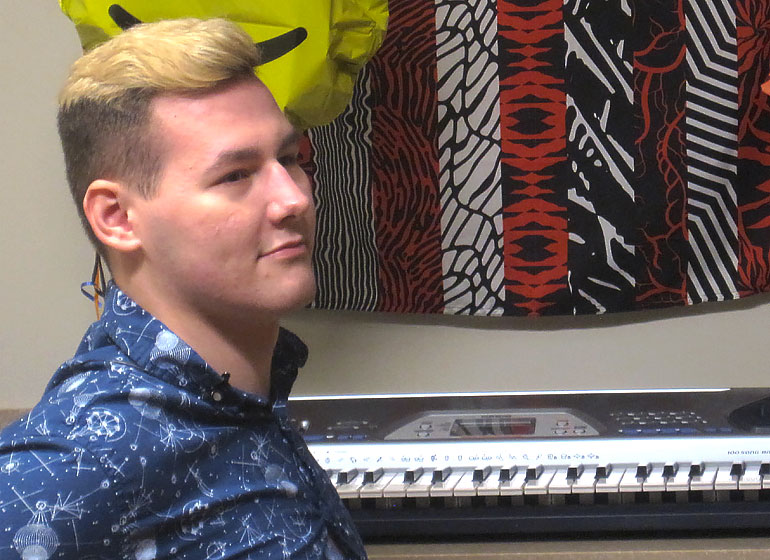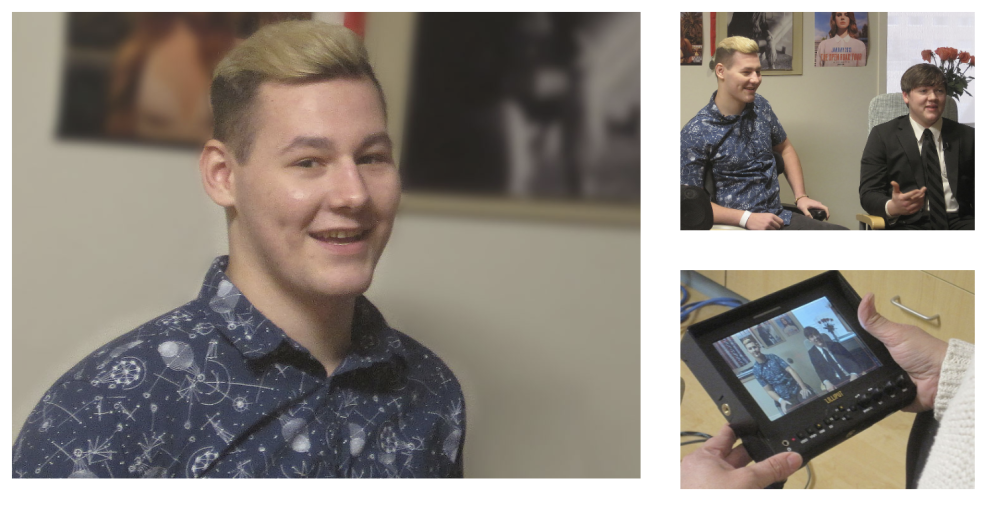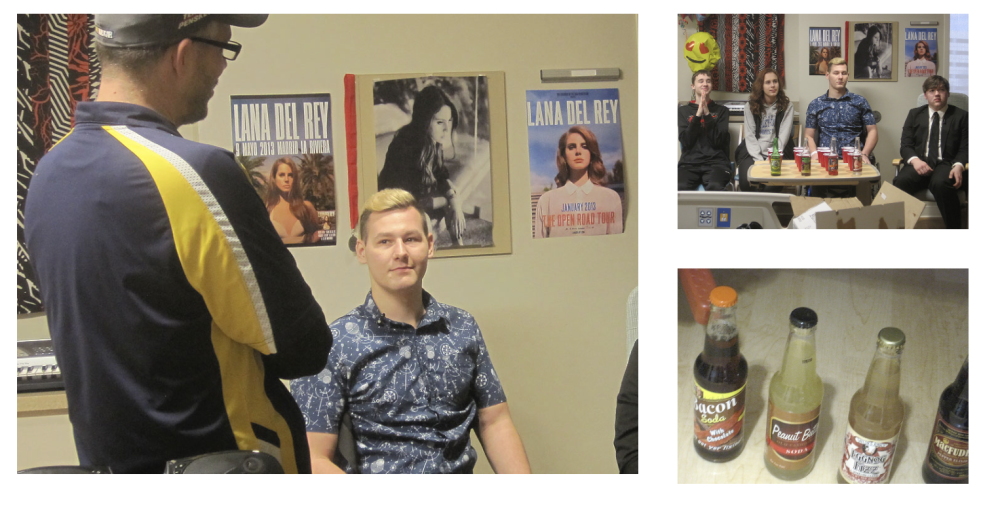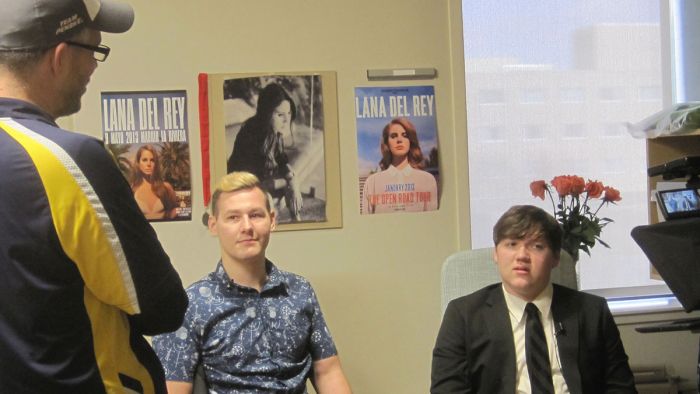This is not what Earl Weir planned for his junior year in high school. The 17-year-old from Howard Lake, Minnesota was a busy teenager—involved in his school’s broadcast club, spending time hunting and fishing with his dad and listening to music with his mom.
Earl is an example of how life can change in an instant.

He didn’t feel well over his Christmas break and decided to spend some time relaxing at his mother’s house. His health quickly went downhill and his mother took him to the emergency room at a Twin Cities hospital.
After many tests he was eventually diagnosed with transverse myelitis. It’s a neurological disorder in which the spinal cord is inflamed and that causes damage to the myelin—the fatty insulating substance that covers nerve cell fibers. This damage causes scars in the nervous system and can interrupt communication between the nerves in the spinal cord and the rest of the body. Transverse myelitis is a relatively rare disease and, in the majority of cases, the cause is unknown.
As Earl describes it, the illness left him without feeling in his body from his chest down to his toes. In February, he was transferred to Gillette Children's to participate in a rigorous rehabilitation program. He was on the inpatient unit and spent four to six hours a day in intense physical and occupational therapy. “I actually like the therapy sessions,” Earl says. “The therapists make me work hard but they’re awesome. They’re pushing me so I can do things for myself and gain strength.”
One of Earl’s doctors, Gillette pediatric rehabilitation medicine specialist, Nanette Aldahondo, MD, says Earl is “a very strong and resilient young man who has committed 100% of his efforts and energy toward his rehabilitation.”
Earl’s pediatric neurologist, Amanda Moen, MD, says Earl is doing all the right things but it’s difficult to predict a patient’s path to recovery. “It’s just one of the hardest parts of dealing with transverse myelitis, patients and their families want to know what their future holds. Earl has received the most aggressive medical treatment and therapies, and despite the best medical interventions, there are patients who will not recover, and we don’t have the tools to predict at the time of diagnosis which patients those will be,” Moen says.
Due to the issues with his spine, Earl now uses a wheelchair and the once independent teenager needs some assistance for everyday tasks like bathing and getting dressed.
There have been some dark days for Earl and his family but they don’t want to focus on that part of his story. Instead, the family is trying to boost Earl’s spirits and engage him the enjoyable hobbies he participated in before his illness.

Cue the Cameras
Earl stays in touch with his classmates at Howard Lake—Waverly—Winsted (HLWW) high school. He looks forward to returning to the classroom and resuming activities like being an anchor for KLKR, the school’s broadcast club.
Recently, he had the opportunity to get back into the anchor chair, or, as Earl describes it, “wheel” into the anchor chair when several members of the KLKR team traveled 90 minutes to the St. Paul campus of Gillette on a Saturday. The broadcast team wanted to include Earl in their weekly news show.
Earl’s friend and news anchor, Chase Lange, interviewed him about transverse myelitis and his recovery. Earl told the viewing audience he’s glad he came to Gillette and praised the newly remodeled inpatient rehab rooms. “I have a mini fridge in my room and the space is big enough for my friends and family to visit,” Earl reports.
The second half of the news show featured a taste testing of sodas purchased during the group’s recent tour of Blue Sun Soda and Sweets Shop in Spring Lake Park, Minn. The store boasts more than 1,300 flavors of soda. Broadcast club supervisors and teachers, Joanie Kocher and Rick Smith, had fun setting up a blind taste test for the student broadcasters. It featured mystery flavors including Eggnog Fizz, Pimple Pop, and Bacon. Earl enjoyed risking his taste buds with his fellow students and he appreciated the opportunity to spend time with his peers. The sodas produced grimaces, giggles and negative reviews from the students. Not a surprise.
Earl’s dad, Dolf Weir, liked seeing his son having fun and is grateful for the community support his family has received. “I’m an electrician and know many people in the construction trades,” Weir says. “A group of guys and people in our church rallied around us. We now have a wheelchair ramp in the front of our house. A bathroom on the first floor has been totally remodeled to make it accessible and some doorways have been widened so Earl can move around the house easily in his wheelchair. It’s amazing what the community has done for us.”
Dolf Weir has lots of plans for his son and is focused on getting Earl into his home routine. “I’m looking into accessible deer stands and getting an accessible four-wheeler so Earl can have fun driving around in the country,” Weir says.

An Uncertain Future
Doctors predict it might take up to eight months to gauge the extent of Earl’s recovery. About a third of people who contract transverse myelitis make a full recovery, another third have a partial recovery and the final third can expect to make a limited recovery.
Earl tries to be patient and upbeat. He says the time at Gillette allowed him to reflect on his life and future. He looks forward to getting back to his school’s broadcasting studio, eating a home cooked meal and avoiding Eggnog Fizz soda.
Pediatric neurologist, Amanda Moen, MD, says no matter what his physical recovery looks like, Earl’s future is bright. “You have this young man with this great sense of humor. He has such energy. He’s going to have a successful life. Earl’s going places,” Moen insists.
 Home Page
Home Page

